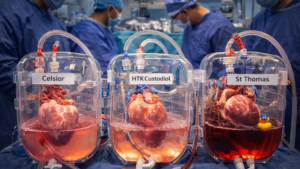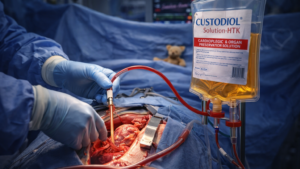
Long-Term Outcome of Myocardial Protection in Heart Transplantation: Comparison Among 3 Different Solutions 
This 20-year single-center study of 528 heart transplant recipients compared three preservation solutions: Celsior, HTK-Custodiol, and St Thomas. HTK-Custodiol was associated with a significantly higher rate of severe primary graft dysfunction (10.2% vs 4.5%), but long-term survival and rejection rates were similar across groups. Severe PGD, ischemic time, and donor/recipient age predicted late mortality. Authors advise caution with HTK-Custodiol.










